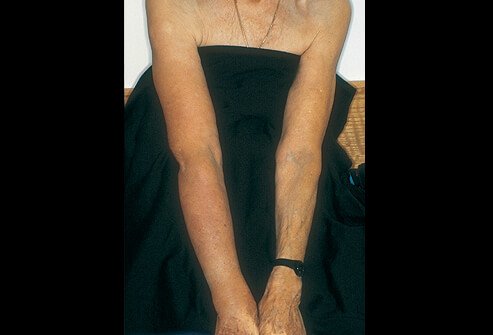Lymphedema
Picture of Lymphedema

Lymphedema: A common chronic, debilitating condition in which excess fluid called lymph collects in tissues and causes swelling (edema).
Lymphedema (edema due to lymphatic fluid) may occur in the arms or legs. This often happens after lymph vessels or lymph nodes in the axilla (armpit) or groin are removed by surgery or damaged by radiation, impairing the normal drainage of lymphatic fluid. Lymphedema may also be caused by a mass, such as a tumor, pressing on the lymphatic vessels.
Congenital Lymphedema: In many cases, lymphedema is evident at birth and is due to a congenital malformation (birth defect) of the lymphatic system. Congenital lymphedema can be associated with Noonan and Turner syndromes, and several forms of lymphedema are clearly due to genetic factors.
Genetic Factors in Lymphedema: Hereditary lymphedema is heterogeneous and usually occurs as an autosomal dominant trait. The most common form of congenital primary hereditary lymphedema is Milroy disease, which is sometimes caused by mutations in the vascular endothelial growth factor receptor-3 gene (VEGFR-3, or FLT4).
Lymphedema-Distichiasis (LD) Syndrome: A less common cause of hereditary lymphedema is lymphedema-distichiasis (LD) syndrome, characterized by lymphedema (primarily of the limbs, with variable age of onset) and distichiasis (double rows of eyelashes). It may also include heart defects, cleft palate, extradural cysts, and photophobia. The gene for LD was mapped by linkage studies to chromosome band 16q24.3. In families with LD, mutations have been found in the FOXC2 (MFH-1) gene, a member of the forkhead/winged-helix family of transcription factors involved in diverse developmental pathways. (Fang et al., Am J Hum Genet 67:1382–1388, 2000)
Image Source: Color Atlas & Synopsis of Pediatric Dermatology
Kay Shou-Mei Kane, Jen Bissonette Ryder, Richard Allen Johnson, Howard P. Baden, Alexander Stratigos
Copyright 2002 by The McGraw-Hill Companies, Inc. All rights reserved.
Source: MedTerms™ Medical Dictionary by MedicineNet, Inc.
